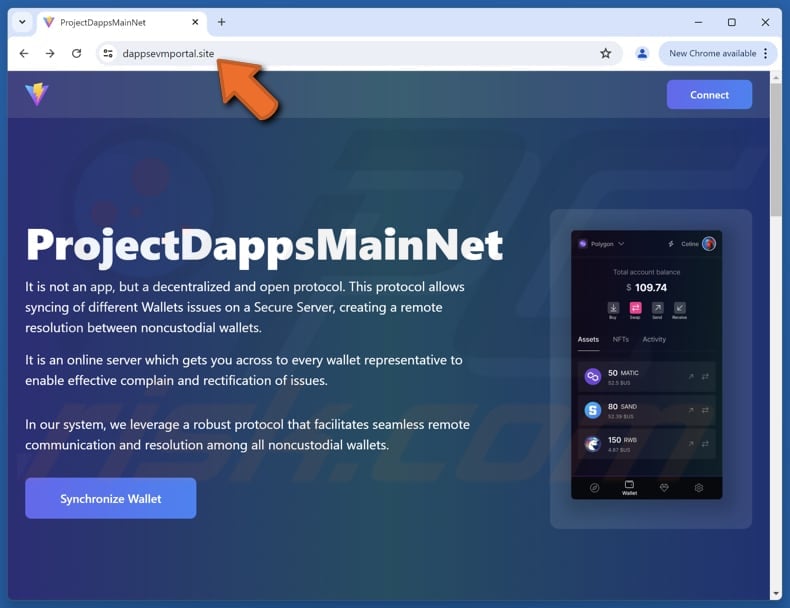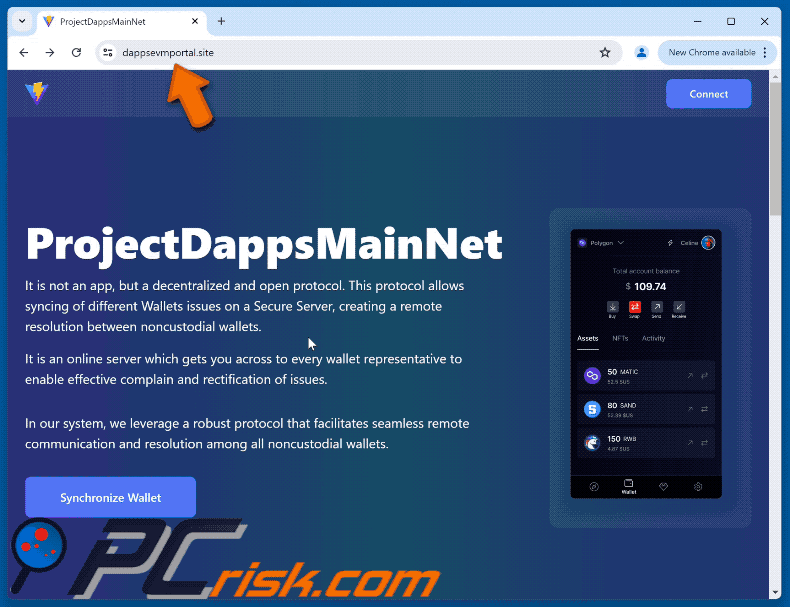How to identify scams like the fake "Project Dapps Main Net" site
Phishing/ScamAlso Known As: Fake Project Dapps Main Net website
Get free scan and check if your device is infected.
Remove it nowTo use full-featured product, you have to purchase a license for Combo Cleaner. Seven days free trial available. Combo Cleaner is owned and operated by RCS LT, the parent company of PCRisk.com.
What kind of scam is "Project Dapps Main Net"?
We have examined the site (dappsevmportal[.]site) and found that it aims to steal personal information from unsuspecting visitors. The scammers behind it can use this information to drain crypto wallets. It is important to recognize scam websites like this one to avoid financial loss or other issues.

"Project Dapps Main Net" fake site in detail
ProjectDappsMainNet (dappsevmportal[.]site) is presented as a decentralized and open protocol that resolves wallet-related issues through remote synchronization. It claims to operate a secure server that connects users to wallet representatives, offering assistance with complaints and problem resolution for noncustodial wallets.
Overall, the scam site is promoted as a platform for seamless communication between wallets and a helpful intermediary in the decentralized finance space. In reality, this site is a scam. It misleads visitors into believing they can use the offered services by synchronizing their wallets.
However, the real goal is to trick users into revealing sensitive information, such as secret phrases or private keys. Users who interact with the site risk compromising their funds, as any information entered can be used to access and drain their wallets. Thus, it is highly advisable not to close such pages if opened to avoid monetary loss.
| Name | Fake Project Dapps Main Net website |
| Threat Type | Phishing, Scam, Social Engineering, Fraud |
| Fake Claim | The platform resolves wallet-related issues |
| Related Domain | dappsevmportal[.]site |
| Detection Names (dappsevmportal[.]site) | CRDF (Malicious), Full List Of Detections (VirusTotal) |
| Symptoms | Unofficial domain, lack of official verification, unrealistic claims, too good-to-be-true promises |
| Distribution methods | Fake social media accounts, deceptive websites, rogue online advertisements. |
| Damage | Loss of sensitive private information, monetary loss. |
| Malware Removal (Windows) |
To eliminate possible malware infections, scan your computer with legitimate antivirus software. Our security researchers recommend using Combo Cleaner. Download Combo CleanerTo use full-featured product, you have to purchase a license for Combo Cleaner. 7 days free trial available. Combo Cleaner is owned and operated by RCS LT, the parent company of PCRisk.com. |
Conclusion
Overall, this is a scam site posing as a decentralized support platform for wallet issues. It tricks users into syncing their wallets to steal sensitive information like recovery phrases. This data is then used to drain funds. Users should avoid interacting with the site and close it immediately if accessed to prevent financial loss.
Some examples of crypto-related scams are "SoDEX Rewards", "DappWallet Node Airdrop" , and "$RCADE Airdrop".
How did I open a scam website?
Users are often deceived into opening scam websites via fake (or stolen) social media accounts, deceptive emails containing links (or files), or misleading advertisements, pop-ups, and similar content on dubious web pages. Notifications from shady sites can also be used as a lure.
Additionally, users can encounter scam websites via rogue advertising networks. These networks are commonly used by torrent sites, pages offering illegal movie streaming, adult pages, etc. Overall, users typically tricked into visiting such websites.
How to avoid visiting scam pages?
Be cautious when visiting suspicious websites - avoid clicking on ads, pop-ups, links, or allowing notifications. Download software and files from official sources like app stores or trusted websites. Keep your operating system and applications up to date.
Be wary of unexpected, irrelevant emails or messages from unknown senders, especially those with attachments or links. Use trusted antivirus software to perform regular system scans. If your computer is already infected with unwanted apps, we recommend running a scan with Combo Cleaner Antivirus for Windows to automatically eliminate them.
The appearance of "Project Dapps Main Net" scam website (GIF):

Instant automatic malware removal:
Manual threat removal might be a lengthy and complicated process that requires advanced IT skills. Combo Cleaner is a professional automatic malware removal tool that is recommended to get rid of malware. Download it by clicking the button below:
DOWNLOAD Combo CleanerBy downloading any software listed on this website you agree to our Privacy Policy and Terms of Use. To use full-featured product, you have to purchase a license for Combo Cleaner. 7 days free trial available. Combo Cleaner is owned and operated by RCS LT, the parent company of PCRisk.com.
Quick menu:
- What is Fake Project Dapps Main Net website?
- How to identify a pop-up scam?
- How do pop-up scams work?
- How to remove fake pop-ups?
- How to prevent fake pop-ups?
- What to do if you fell for a pop-up scam?
How to identify a pop-up scam?
Pop-up windows with various fake messages are a common type of lures cybercriminals use. They collect sensitive personal data, trick Internet users into calling fake tech support numbers, subscribe to useless online services, invest in shady cryptocurrency schemes, etc.
While in the majority of cases these pop-ups don't infect users' devices with malware, they can cause direct monetary loss or could result in identity theft.
Cybercriminals strive to create their rogue pop-up windows to look trustworthy, however, scams typically have the following characteristics:
- Spelling mistakes and non-professional images - Closely inspect the information displayed in a pop-up. Spelling mistakes and unprofessional images could be a sign of a scam.
- Sense of urgency - Countdown timer with a couple of minutes on it, asking you to enter your personal information or subscribe to some online service.
- Statements that you won something - If you haven't participated in a lottery, online competition, etc., and you see a pop-up window stating that you won.
- Computer or mobile device scan - A pop-up window that scans your device and informs of detected issues - is undoubtedly a scam; webpages cannot perform such actions.
- Exclusivity - Pop-up windows stating that only you are given secret access to a financial scheme that can quickly make you rich.
Example of a pop-up scam:

How do pop-up scams work?
Cybercriminals and deceptive marketers usually use various advertising networks, search engine poisoning techniques, and shady websites to generate traffic to their pop-ups. Users land on their online lures after clicking on fake download buttons, using a torrent website, or simply clicking on an Internet search engine result.
Based on users' location and device information, they are presented with a scam pop-up. Lures presented in such pop-ups range from get-rich-quick schemes to fake virus scans.
How to remove fake pop-ups?
In most cases, pop-up scams do not infect users' devices with malware. If you encountered a scam pop-up, simply closing it should be enough. In some cases scam, pop-ups may be hard to close; in such cases - close your Internet browser and restart it.
In extremely rare cases, you might need to reset your Internet browser. For this, use our instructions explaining how to reset Internet browser settings.
How to prevent fake pop-ups?
To prevent seeing pop-up scams, you should visit only reputable websites. Torrent, Crack, free online movie streaming, YouTube video download, and other websites of similar reputation commonly redirect Internet users to pop-up scams.
To minimize the risk of encountering pop-up scams, you should keep your Internet browsers up-to-date and use reputable anti-malware application. For this purpose, we recommend Combo Cleaner Antivirus for Windows.
What to do if you fell for a pop-up scam?
This depends on the type of scam that you fell for. Most commonly, pop-up scams try to trick users into sending money, giving away personal information, or giving access to one's device.
- If you sent money to scammers: You should contact your financial institution and explain that you were scammed. If informed promptly, there's a chance to get your money back.
- If you gave away your personal information: You should change your passwords and enable two-factor authentication in all online services that you use. Visit Federal Trade Commission to report identity theft and get personalized recovery steps.
- If you let scammers connect to your device: You should scan your computer with reputable anti-malware (we recommend Combo Cleaner Antivirus for Windows) - cyber criminals could have planted trojans, keyloggers, and other malware, don't use your computer until removing possible threats.
- Help other Internet users: report Internet scams to Federal Trade Commission.
Frequently Asked Questions (FAQ)
What is a crypto scam?
These fraudulent pages mimic genuine crypto services like exchanges and wallets, aiming to manipulate users into compromising their crypto assets.
What is the purpose of a crypto scam?
Typically, the goal is to steal cryptocurrency. Scammers use various methods, for instance, they aim to trick users into providing login information or executing crypto drainers.
Why do I encounter scam sites?
Scam pages are often promoted through a variety of deceptive methods, including fake social media accounts, and misleading ads. Users may also be directed to these malicious sites via rogue advertising networks (often associated with torrent platforms, adult content, and illegal streaming sites), notifications from shady pages, and deceptive emails.
Will Combo Cleaner protect me from scams?
Combo Cleaner scans websites for potential threats, detects scam pages, alerts users, and blocks access to malicious content.
Share:

Tomas Meskauskas
Expert security researcher, professional malware analyst
I am passionate about computer security and technology. I have an experience of over 10 years working in various companies related to computer technical issue solving and Internet security. I have been working as an author and editor for pcrisk.com since 2010. Follow me on Twitter and LinkedIn to stay informed about the latest online security threats.
PCrisk security portal is brought by a company RCS LT.
Joined forces of security researchers help educate computer users about the latest online security threats. More information about the company RCS LT.
Our malware removal guides are free. However, if you want to support us you can send us a donation.
DonatePCrisk security portal is brought by a company RCS LT.
Joined forces of security researchers help educate computer users about the latest online security threats. More information about the company RCS LT.
Our malware removal guides are free. However, if you want to support us you can send us a donation.
Donate
▼ Show Discussion